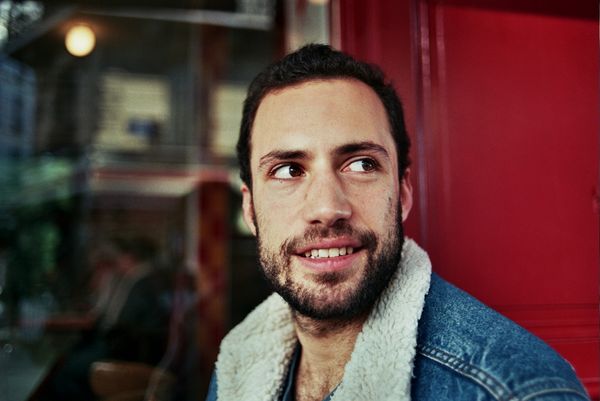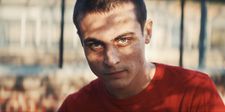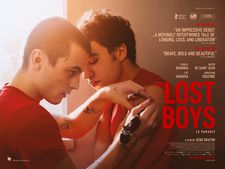 |
| Zeno Graton Photo: Caroline Monnet |
Zeno Graton’s claustrophobic, youth detention centre set feature debut, centres on a love story between newcomer William (Julien De Saint Jean) and Joe (Khalil Ben Gharbia), who is preparing to leave. The pair feel an instant attraction, yet their paths are destined to diverge, provoking a conflict in Joe between his forthcoming freedom and this newfound connection, that offers him hope.
In conversation with Eye For Film, Graton discussed the film’s literary and personal origins, liberating masculinity from imprisoned constructs, and challenging the narrative of shame and guilt.
Paul Risker: How do you reflect on your personal journey of cinematic discovery, and the films that have defined this experience?
Zeno Graton: What I now understand is when you sit down and try to write, you can't lie to yourself. You have to write about you, and even if you're not writing about yourself, you're writing about things that are important to you as a human being. So, you have to know yourself.
 |
| Khalil Ben Gharbia in The Lost Boys |
I was crazy about cinema and I'd watch a lot of films. But I now realise, having made The Lost Boys, some queer films I watched when I was young had a big impact on me. I remember a short film by François Ozon called A Summer Dress (Une Robe d'Été), that I’d watch secretly. I feel when you write, even your parents can't know what you're writing about, otherwise it's not as personal as you think it is. In that manner, this was an impactful film.
When I was 18, I discovered Sean Penn’s Into the Wild (2007), and that had a big impact on me. It’s about capitalism and wanting to break free of our oppressive system. There was something striking about how I could break free of something that as an angry teenager, I already felt was imprisoning me.
I also remember Andrea Arnold’s Fish Tank (2009) being important because there was a female gaze upon a male body. It was new and so out there at the time. It was openminded with its young character. Also, its raw cinematography, the authenticity of everything was a major turning point for me in my view on cinema.
PR: Picking up on your point about Arnold’s use of the visual language, how did you approach the film’s cinematography to express your intentions?
ZG: I said to my cinematographer, Olivier Boonjing, “Let’s make a love story, and let’s be very honest about that, even if the setting is very harsh and social.” I'm okay with going a bit off the path and the film becoming a little dreamy or fantastical because it will uplift the passion and the poetry that the film needs. We opted for this wide format, cinemascope, scale.
What I like about this format is you also have the architecture [in the frame] that will imprison them. It's also a good format for groups because you can place everyone in the frame, and for love stories because it's the only format where you can have two close-ups of faces next to one another. I knew the two characters were going to constantly be next to one another.
For the movement, I wanted to be generous. I wanted dollies; I wanted the camera on the car following them. I wanted a sense of freedom and breathing, to contrast when we locked them up in the frame. This format also allowed for a frame within a frame – you can block one half of the screen and still have space to do stuff.
The anamorphic lenses we used allow you to have a sense of blur in the background, that's very aquatic. It’s a little dreamy and it was there to break us out of this social aspect of the place we were filming.
 |
| Julien De Saint Jean in The Lost Boys |
When you're in the financial reality of shooting a first film, you don't have as many days as you want. Sometimes you’ll have two big scenes in the same day, and you can't lose time on the cinematography. We were caught up by that, but I have no regrets because it's a miracle that the film is there onscreen.
PR: What compelled you to tell this story at this point in time?
ZG: There were two parallel things that popped into my mind. I wanted to make a love story and I was inspired by Jean Genet, a French author who wrote a lot about love in prison in the Forties and Fifties. He's very political in his writing, meaning the way he portrayed it as free and sensual was avant-garde. He broke out of the time he was living in, which was very different back then. I was inspired by that, and I wanted to make a story that would be as free as his were.
He spent a lot of time in prison and his more erotic stories are about that. He made a short film called, A Song Of Love (Un Chant d'Amour, 1950), his only film. It portrays two lovers in prison cells next to one another. My film was clearly an homage to his work because it constructed me as a person – not only as a queer person, but my anti-authoritarianism, as someone who questions the world he lives in.
A member of my family was placed in one of these centres when I was young, and it left a mark on me. I saw my family and society looking down on him. I’d already perceived that his delinquency was activated by much of the social inequality and racism, and the treatment he received didn't help him at all. There was a lot of hypocrisy around these centres that claimed to reinsert them [into society] but didn’t.
Those two things merged, and I emailed the Ministry of Youth. I'd already made some short films, so they knew who I was, and I got the chance to enter those places for one month to deliver an authentic and accurate point of view. I started writing after that and then I went back when I had a version of the script to confront it, to talk to the kids and the educators. It was important to portray the educators as people who fight for them because this wasn’t something I knew. It was important to praise their work in a system that is impeding them from achieving what they want to. It was a bit of a journalistic and sociological approach.
PR: There’s something about prison spaces that draws our interest. These two characters that are close yet separated by the walls, plays on how spatially, the prison is defined by contradictions.
ZG: I wanted to make a love story, but also a group movie and I tried to talk about masculinity in a broader sense of the word. There's a sense of tragedy, but I wanted there to be a lot of tenderness, by showing boys being tender to one another and stepping outside of the constructed box they're forced into.
 |
| The Lost Boys poster |
The prison is a metaphor for their homophobic society that doesn't allow them to love each other. It’s also a prison that imprisons men into the construct of masculinity, and these boys break free of it all. It was important to position the conflict outside of them dramaturgically speaking, and I wanted to show two lovers who were okay with who they were. I didn’t want to write another story where the conflict is the overcoming of the shame of homosexuality. These [types of] stories put queer people in a box that's comfortable for mainstream society.
It's more subversive for me to show guys being tender towards one another because it steps out of the construct - both gay people who are supposed to be victims, sad and brutal towards each other, unable to connect, as well as being outside of masculinity, where you’re not allowed to express tenderness, otherwise you're not a man. The prison works as an external obstacle only from which the guys, all of them, need to break out for different reasons.
PR: The themes and ideas you’re engaging with here, don’t only belong to the screen and theatrical space, but engage in current social conversations about sexuality and gender.
ZG: Portraying a queer Arab leading character in this movie is creating a conversation, because we're often used to seeing the Arab characters being victimised or fetishised. Art is worth a thousand words, and by showing an Arab guy who would pursue his desire, a man, and not feel that there's anything wrong about this makes him a political figure. Choosing to make this film was already a statement in itself.
We put this in front of the audience who don't question it. We’ve experienced a rise of the far-right wing movement all across Europe, and the backlash this movement creates is a reflection of an old world not willing to die, but it will. I'm considering this backlash, and we need to be mindful of who we support and how we support them. But I'm also hopeful that in the future, even though it may not seem that way, I trust the young generation will replace the old one. It’s going in the right direction, and they inspired me when making this movie. It's basically about young people in prisons trying to break free.
The Lost Boys is playing in cinemas and on digital now.





















